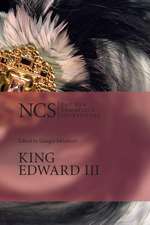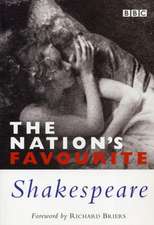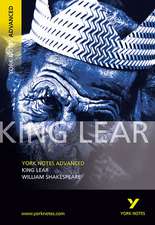Shakespeare and Wales: From the Marches to the Assembly
Autor Willy Maley Editat de Philip Schwyzeren Limba Engleză Paperback – 11 noi 2016
| Toate formatele și edițiile | Preț | Express |
|---|---|---|
| Paperback (1) | 469.34 lei 6-8 săpt. | |
| Taylor & Francis – 11 noi 2016 | 469.34 lei 6-8 săpt. | |
| Hardback (1) | 1054.71 lei 6-8 săpt. | |
| Taylor & Francis – 28 feb 2010 | 1054.71 lei 6-8 săpt. |
Preț: 469.34 lei
Nou
Puncte Express: 704
Preț estimativ în valută:
89.81€ • 93.89$ • 75.90£
89.81€ • 93.89$ • 75.90£
Carte tipărită la comandă
Livrare economică 07-21 martie
Preluare comenzi: 021 569.72.76
Specificații
ISBN-13: 9781138253605
ISBN-10: 113825360X
Pagini: 260
Dimensiuni: 156 x 234 mm
Greutate: 0.45 kg
Ediția:1
Editura: Taylor & Francis
Colecția Routledge
Locul publicării:Oxford, United Kingdom
ISBN-10: 113825360X
Pagini: 260
Dimensiuni: 156 x 234 mm
Greutate: 0.45 kg
Ediția:1
Editura: Taylor & Francis
Colecția Routledge
Locul publicării:Oxford, United Kingdom
Notă biografică
Willy Maley, Professor of English Literature at the University of Glasgow, UK. Philip Schwyzer is Assistant Professor of English at the University of Exeter, UK.
Recenzii
’... what is most remarkable about Shakespeare and Wales is not its ability to surprise and delight (although it does that), but the fact that it has taken this long for scholarship to recognise the centrality of Wales to Shakespeare's works... this is a collection that succeeds in throwing new light on well-thumbed plays. It puts Wales at the centre of debates about Shakespeare's attitude towards the British politics of his day - and with those politics resurfacing in our era, Shakespeare and Wales serves as a powerful reminder of the Bard of Avon's continuing relevance to the now.’ Times Higher Education ’The present volume digs deeper [...] with the various contributors providing much thought-provoking context for Shakespeare’s Welsh connections and the critical response to them over the years.’ Sixteenth Century Journal 'The collection offers fresh and often surprising readings.' Shakespeare Jahrbuch, 2012
Cuprins
Introduction A Welsh Correction, WillyMaley, PhilipSchwyzer; Chapter 1 1Parts of this chapter draw on material previously published in different form in Kate Chedgzoy, ‘The Civility of Early Modern Welsh Women’, in Jennifer Richards (ed.), Early Modern Civil Discourses (Basingstoke, 2003), pp. 162–82 and Women’s Writing in the British Atlantic World, 1550–1700: Memory, Place and History (Cambridge, 2007)., KateChedgzoy; Chapter 2 Thirteen Ways of Looking Like a Welshman: Shakespeare and his Contemporaries, PhilipSchwyzer; Chapter 3 Glyn Dwr, Glendouer, Glendourdy and Glendower, David J.Baker; Chapter 4 Rhymer, Minstrel Lady Mortimer and the Power of Welsh Words, MeganLloyd; Chapter 5 ‘bastard Normans, Norman bastards’: Anomalous Identities in The Life of Henry the Fift, ChristopherIvic; Chapter 6 Shakespeare’s ‘welsch men’ and the ‘King’s English’, MargaretTudeau-Clayton; Chapter 7 ‘O, I am ignorance itself in this!’: Listening to Welsh in Shakespeare and Armin, HuwGriffiths; Chapter 8 Contextualizing 1610: Cymbeline, The Valiant Welshman, and The Princes of Wales, Marisa R.Cull; Chapter 9 Cymbeline, the translatio imperii, and the matter of Britain, LisaHopkins; Chapter 10 1 I am grateful to the Irish Research Council for Humanities and Social Sciences for a Research Fellowship and to the College of Arts, Celtic Studies and Social Sciences of University College Cork for research funding which aided completion of this work. I am also very grateful to Dr Matthew Woodcock and Professor James Knowles, as well as to the editors of the current volume, for useful critical reactions and proofreading., AndrewKing; Chapter 11 ‘Let a Welsh correction teach you a good English condition’: Shakespeare, Wales and the Critics, WillyMaley; Chapter 12 Cackling Home to Camelot: Shakespeare’s Welsh Roots, RichardWilson; afterword Afterword, KatieGramich;
Descriere
Shakespeare and Wales offers a 'Welsh correction' to a long-standing deficiency. It brings together experts in the field from both sides of the Atlantic to establish a detailed historical context that illustrates the range and richness of Shakespeare's Welsh sources and resources, and confirms the degree to which Shakespeare continues to impact upon Welsh culture and identity.













